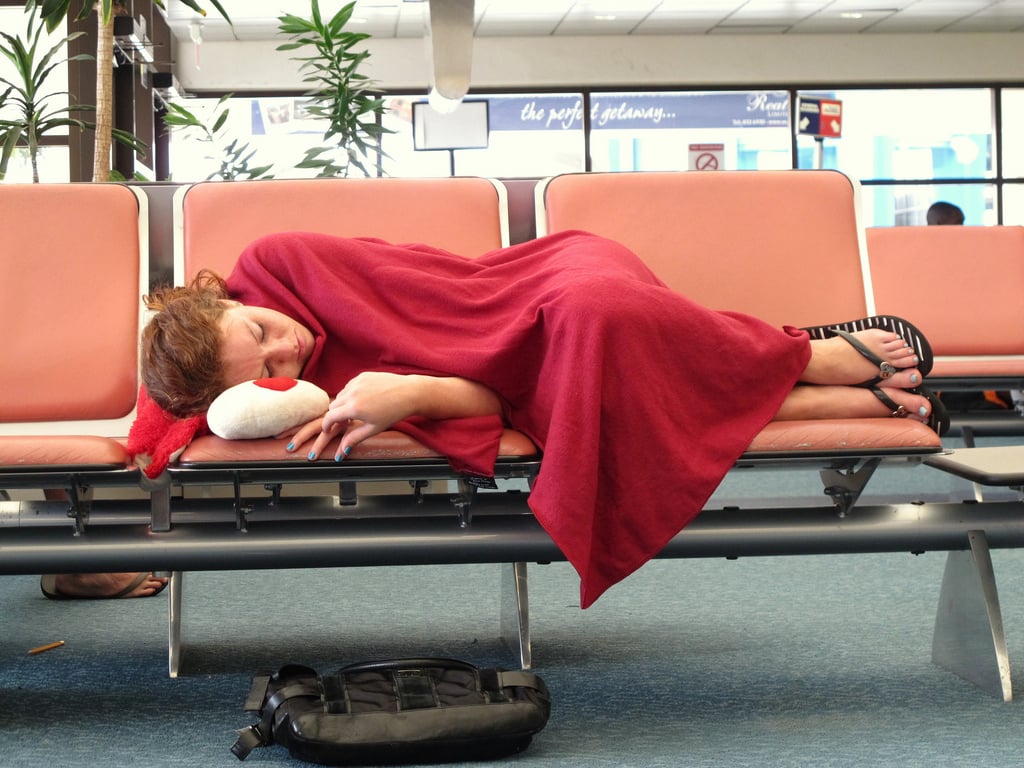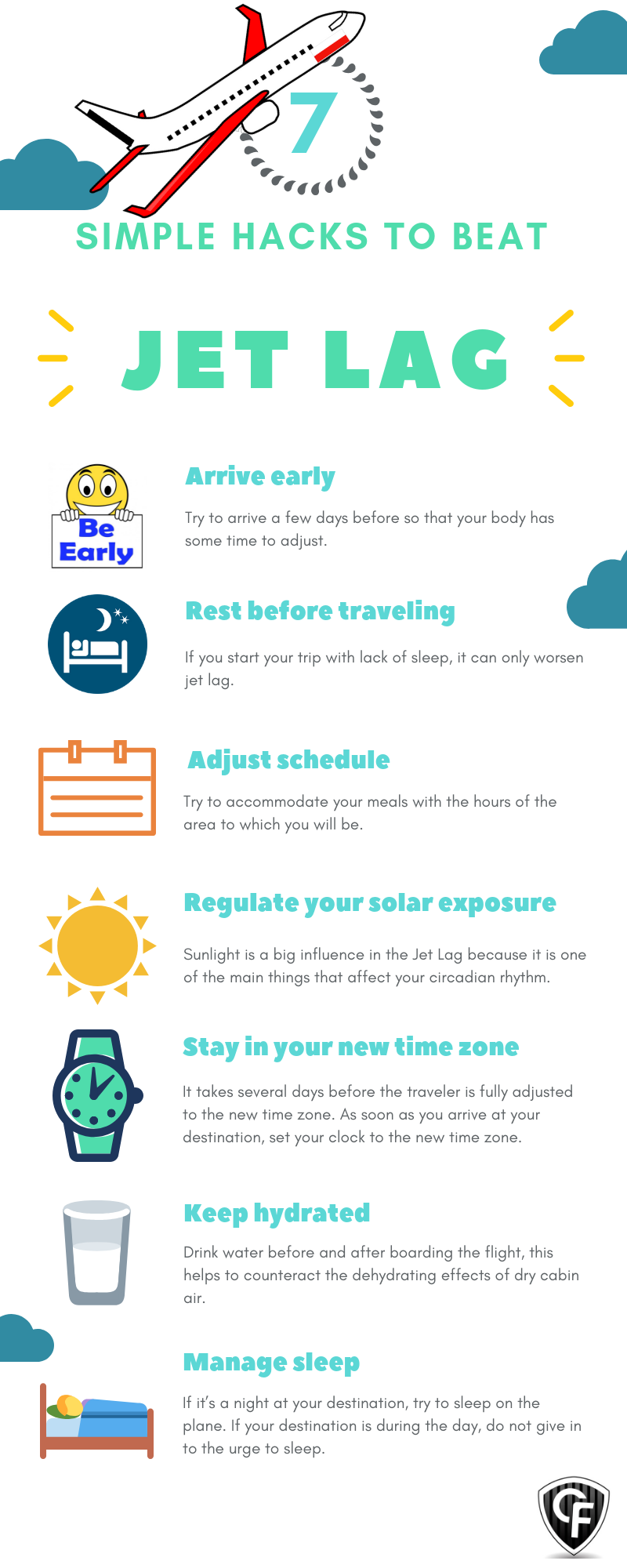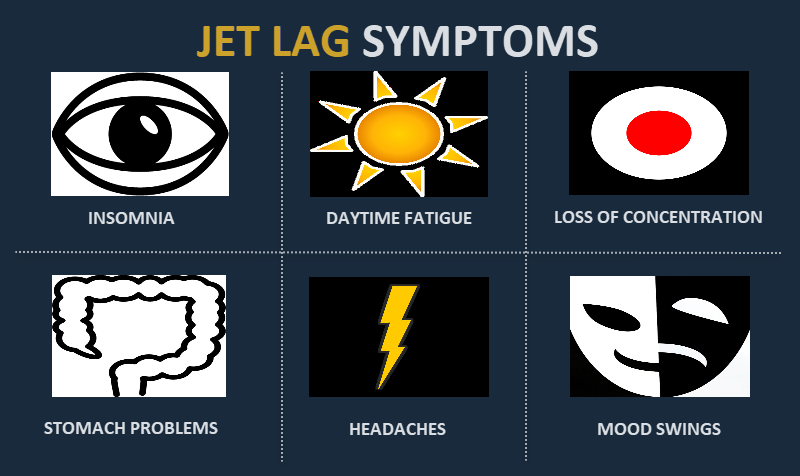What is Jet Lag? Symptoms, Risk Factors & How to Get Over

It could mean even more to your body, and if you don’t know what it is, here we’re going to give you some jet lag tips on what it really is and how to get rid of it.

What is Jet Lag?
The first thing to know about Jet lag is that it’s an effect of air travel through a number of time zones in the circadian rhythm of our body. Circa is the Latin word for “about” and diem means “day.” This rhythm has a clock of approximately 24 hours.
The body operates with many circadian rhythms, such as body temperature regulation, hormone function, airway function, and kidney function. When we’re in a place, our body becomes accustomed and engages all its rhythm to that internal clock.
When we travel through multiple time zones, the time zone changes but our body clock is still in the time of the region we left, that means that our body is not in sync with the area where we are. That’s a very important factor to consider.
It doesn’t matter if it’s a trip with your family, business travel or any other reason. Planning and taking it into consideration is the best way to face it. Don’t let your trip be ruined by not taking the necessary precautions.
What are the Symptoms of Jet Lag?

- Alteration in sleep schedule, insomnia or being sleepy during the day
- Fatigue during the day
- Difficulty in concentrating or unwinding easily
- Stomach problems, constipation or diarrhea
- A general feeling of discomfort
- Mood swings
Symptoms usually occur for a long flight when 2 or more time zones were crossed. If you plan a trip in which you cross only one ‘time zone’ then you don’t have much to worry to adjust to the new time zone. However, it never hurts to take protections.
Risk Factors
Why traveling to the east is worse?
It is important to note that Jet Lag only happens when traveling east-west or west-east
If your trip is from north-south or vice-versa you won’t have any problem because you wouldn’t be going through any time zone. It’s possible that if it’s a very long trip you may still have some problems to get to sleep, but it will only be due to the inconveniences of spending too much time traveling uncomfortable positions on the plane.
How many time zones did you go through?

Traveling frequently
Effects on elderly people
How to get over jet lag?
- Arrive early: If you have a meeting or an event that requires you to be in perfect shape, try to arrive a few days before so that your body has some time to adjust.
- Rest before traveling: If you start your trip with lack of sleep, it can only worsen jet lag. It’s best to rest the days before the trip.
- Adjust your schedule progressively before leaving:
- If you travel to the east, try going to bed an hour earlier, for a few days before your flight so that your body adjusts.
- If you travel west, lay down an hour later than usual. Try to accommodate your meals with the hours of the area to which you will be.
- Regulate your solar exposure: Sunlight is a big influence in the Jet Lag because it is one of the main things that affect your circadian rhythm. The sunset light exposure helps you adjust to a trip to the west and the sunlight of the dawn helps you adapt to a trip to the east.
The only exception is if you go through more than eight time zones with respect to your original time zone. Since the body could confuse the exposure to light in the early morning with the evening. On the contrary, the light of twilight could be interpreted as the dawn.
Therefore, if you went through more than eight time zones to the east, during the first days in your new location, wear sunglasses and avoid the bright morning light and then allow yourself to be exposed to as much sunlight as possible. - Stay in your new time zone: It takes several days before the traveler is fully adjusted to the new time zone. As soon as you arrive at your destination, set your clock to the new time zone. Stay awake until it is night in that place, also try to synchronize your meals with the local time of your destination.
- Keep hydrated: Drink water before and after boarding the flight, this helps to counteract the dehydrating effects of dry cabin air. This dehydration increases jet lag, avoid alcohol and coffee, this can dehydrate and affect sleep.
- Manage sleep: If it’s a night at your destination, try to sleep on the plane. Headphones and eye masks can block sound and sunlight. Sleeping pills can also help you fall asleep. If your destination is during the day, do not give in to the urge to sleep.
How to Beat Jet Lag with Technology?
- Headspace: If flying makes you uneasy, download a meditation app like Headspace. It helps people stress less, focus more and even sleep better. It will teach you the life-changing skills of meditation and mindfulness in just a few minutes a day.
- Neuroon: To improve your sleep, use Neuroon – the world’s first smart sleep mask. Neuroon measures EEG (Electroencephalogram or brainwaves) and uses this data for advanced sleep staging. You can control the device using Neuroon Open app to gather sleep data, show sleep score, and get personalized sleep tips.
- GloToSleep Mask: Uses dimming light to help you fall asleep and gently brightening light to help you wake up naturally.
- SeatGuru App: It helps travelers to choose the best seats and in-flight amenities. Lets You avoid seats at the back of a plane, which are bumpier.
- Jet Lag Rooster: Enter your flight details and your sleep pattern. With a few clicks, the site will create a personalized jet lag plan and offer guidance to help you combat it. Jet Lag Rooster shifts your body clock to reduce or prevent jet lag. Get and follow your personal jet lag plan. It’s free.
The Top 13 Hottest Air Travel Topics You Shouldn’t Miss
- Turn Your Delayed Flight into a Payday: How to Claim Compensation Now
- Maximize Your Flight Compensation: Discover Which Provider Pays the Most
- Healthy Flying: Tips for Staying Hydrated and Avoiding Dehydration on Flights
- Carry-On Essentials: A Guide to Luggage Sizes for Every Major Airline
- What to Pack and What Not to Pack: A Comprehensive Guide to Carry-On Baggage
- Grooming on the Go: How to Pack and Travel with Razors on a Plane
- Fire Safety on Flights: Rules and Best Practices for Bringing Lighters on Board
- Bumpy Rides Ahead: Understanding and Surviving Turbulent Flights
- Wanderlust Goals: A Guide to Visiting the World’s Most Beautiful Destinations
- Safe and Secure: A Complete Guide to Packing Batteries for Air Travel
- Snacking on a Plane: What Foods You Can and Can’t Bring on Board
- Trapped on the Tarmac: Know Your Rights and What to Do During Delays
- Travel Rewards Unlocked: Finding the Best Airline Credit Cards for Free Travel
Sachin Suryawanshi
Digital Marketing Consultant
If your flight delays for more than 3 hours, or was canceled, you may be eligible for compensation up to €600 based on EU 261 rule.
Check For FreeWe offer "No Win - No Fee" Services, so claiming is Risk-Free!
10 best flight-booking sites of 2024
Are you searching for the perfect flight booking portal to snag the cheapest airfares for your next trip? You're not alone. Today, the internet is flooded with options that claim to offer the fastest and most cost-effective booking...
Top 10 Most Beautiful Places In The World To Visit In 2024
When it comes to the world, the place is one of the most beautiful arenas. The most amazing places in the world allow you to set your foot in the world to enjoy the view of the world. In this blog, we have brought for you the top 10 most...
Flight Delays Due To Technical Problem
When Technical Glitches Ground Your Plans: Flight Delays Explained Flight delays can be incredibly frustrating, especially when they disrupt carefully planned itineraries and cause inconvenience to travelers. While various reasons can...



